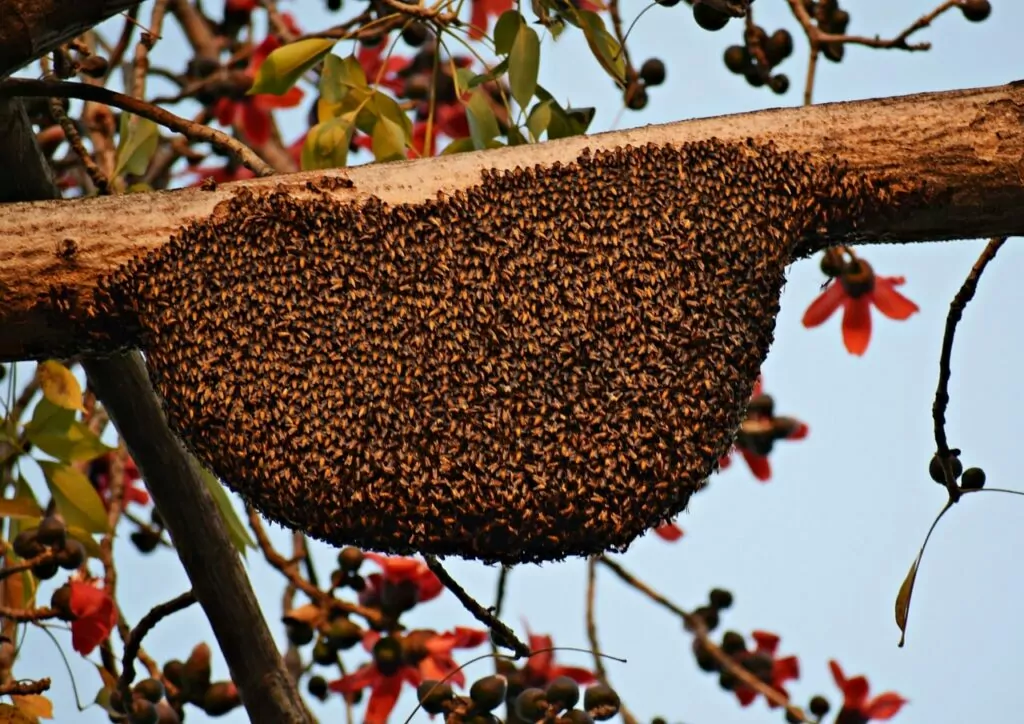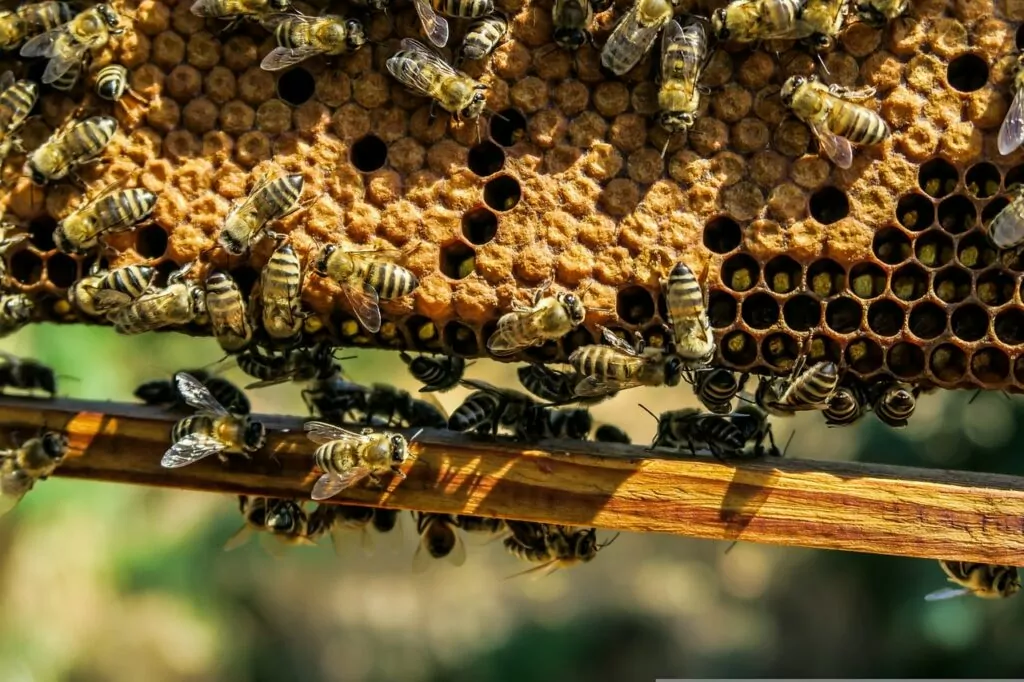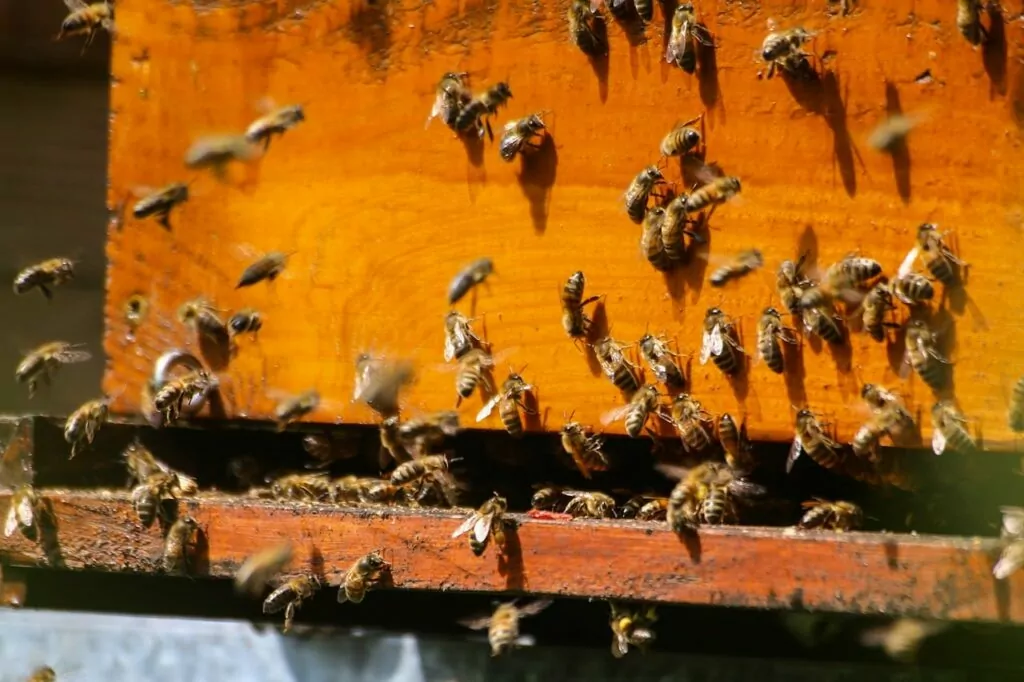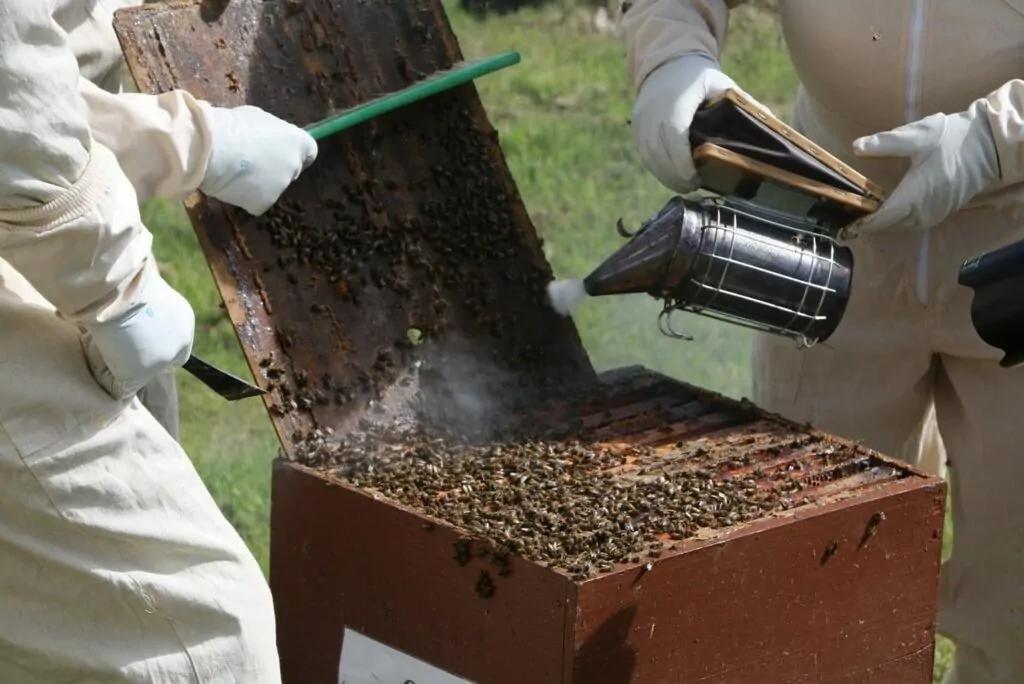There are some facts of life which we simply take for granted, and accept that they are the way they are. But, from time to time, we begin to ponder, and look further into things. One particular question we’re going to be answering today is why do bees make honey?
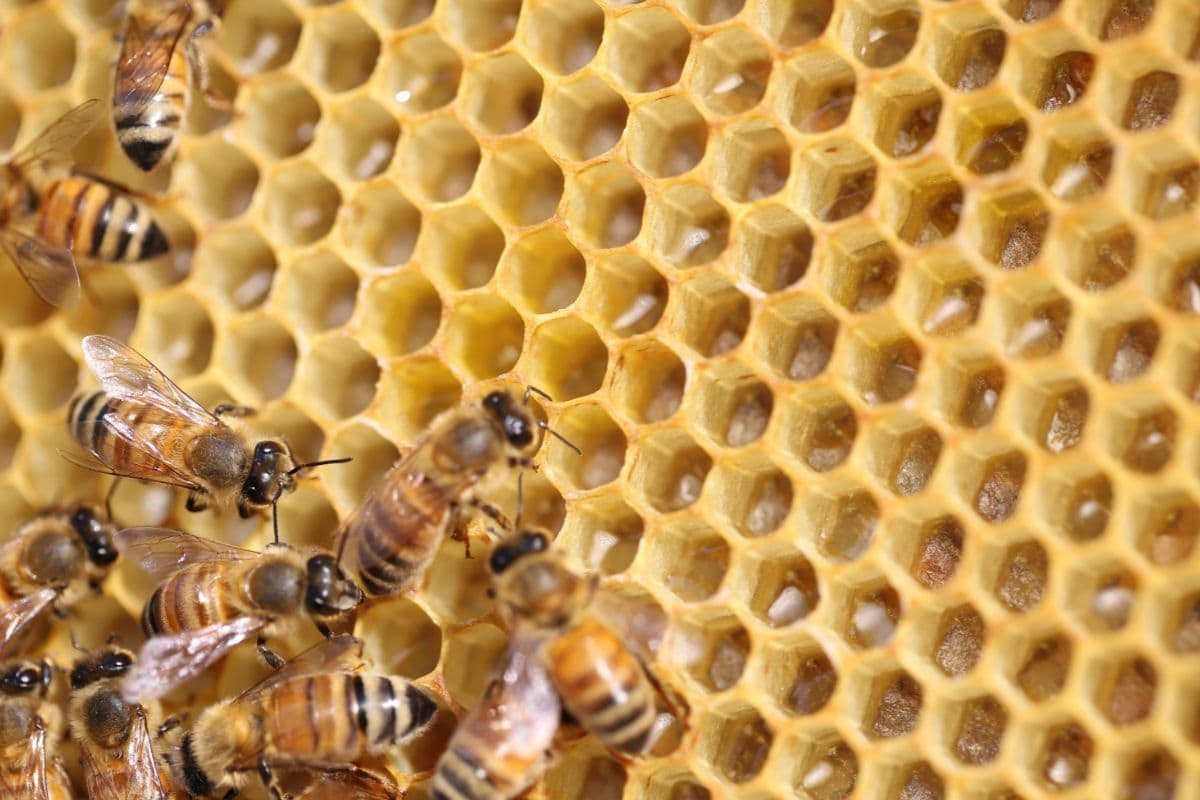
After all, they don’t eat all of it themselves, and yet they spend their entire lives cultivating it. If this is a question that you’ve been pondering recently, don’t worry, you’re not alone. Many people have been asking the same question, and in this article, we’re going to do our best to answer it.
Join us as we delve into the beautiful and wondrous world of bees, and take a look at why exactly they make honey, as well as answering some other frequently asked questions. To find out more, simply keep reading below, as we take a closer look.
What Is Honey?
Now, before we jump straight in and answer the titular question, we think that it’s a good idea to take a look at what exactly honey consists of, apart from being a delicious liquidy treat. Well, honey is essentially a sugar-like substance that has been made up of all the pollen that the bees have collected over time.
It’s been mixed in with something else however, and this is what is called the ‘bee enzyme’. If you’ve never heard of it before, the bee enzyme is something that is contained within the stomach of the bee.
When the nectar is collected, it is mixed in at the location of the bee’s stomach, and in turn, gives it that sugary flavor that we’re all accustomed to. It does this by breaking down the pollen into its rawest form, as it already contains a sugar that we all know about, called sucrose.
Why Do Bees Make Honey?
Now that we’ve taken a closer look at what honey actually consists of, we can move on to discuss why bees make honey in the first place, which is the subject of this article. In terms of why bees make honey, the answer is actually incredibly simple.
As many of you already know, bees emerge during the spring and summer months, because during the winter, the weather is too cold for them to survive. Like any other perennial creature, they need to stock up on food supplies whilst they can, in order to make it through the harsh winter months.
So the reason why bees collect so much honey is because they’re doing it as a mode of survival. There are fewer and fewer flowers around as autumn comes to a close, and if they hadn’t built up their stocks, the bees would have nothing on which to survive.
This means that if they work hard during the spring and summer, they can feed the entire colony for the duration of the year. Some people might be surprised with this answer, especially considering that there is such a large misconception that honey bees don’t actually eat their own nectar, when in reality it’s their key food source.
Honey is excellent for bees in terms of nutrition, and contains a great deal of energy too because of the sugar content.
Is It Wrong To Take Honey From Bees?
Now that you’ve found out why bees make honey, you may be asking yourself some moralistic questions, such as the one above. But, is it, in fact, wrong to take honey from bee colonies? After all, we’ve been doing it for centuries. We would say that this depends on the individual in question.
For example, many vegans forgo honey as a part of their diet, as they believe that it’s wrong to take honey bee’s food source, no matter how small the amount.
In a general sense however, provided that it’s during the warmer months, where flowers bloom in abundance, and the weather is permissible for the bees to go outside, then it’s okay to take a portion of their honey. This is especially true if you’re purchasing your bees locally, from a farm shop, for example.
This honey will likely come from seasoned beekeepers, who know everything there is to know about bees, including how much they need to thrive and survive. If you want to be more ethical, always try to purchase locally instead of in supermarkets.
Human beings aren’t the only type of mammals that have taken honey from bees as a food source, as there are a number of different creatures in the wild who do this too. For example, the honey badger is obsessed with the sweet nectar produced by bees, hence why it has its namesake.
In addition to this, there are a whole host of other insects that are interested in the honey produced by bees too, including hornets and wasps. You may even find some species of birds stealing honey from the hive. Therefore, whether you believe it is moralistic to eat honey or not is entirely up to you.
Is There Such A Thing As Vegan Honey?
Prompted by the question above, some of you might be wondering whether there is such a thing as vegan honey, that tastes like the real thing. Well, the good news is that there are several different large companies out there who are scientifically trying to emulate and reproduce the exact same flavors demonstrated by real honey.
There are many different types of liquid sweeteners that can already be used in place of honey, such maple syrup, agave syrup, and additional artificial sweeteners.
A company called the Vegan Honey Company actually collects pollen themselves, and makes the honey out of this manually, without needing bees in order to produce it for them. This is really making waves, and perhaps might be indicative of where the honey business is going in future.
Why Don’t Bees Eat Their Honey Right Away?
So, some of you after reading the content above, might be wondering why bees don’t just eat their honey right away. Well, the answer is pretty straightforward. They need the honey that they’ve stored more during the winter months than they do during the time of collection.
Because the weather is colder, the bees need nutritious food in order to keep all of their vitals in check. It’s far more difficult for bees to tolerate cold temperatures, and so they need all of the energy they can get.
This is why, if you’re planting any shrubs or flowers in your garden, you do so during the spring and summer months, so that honey bees have plenty of pollen to store up on in preparation for winter.
Does Every Kind Of Bee Make Honey?
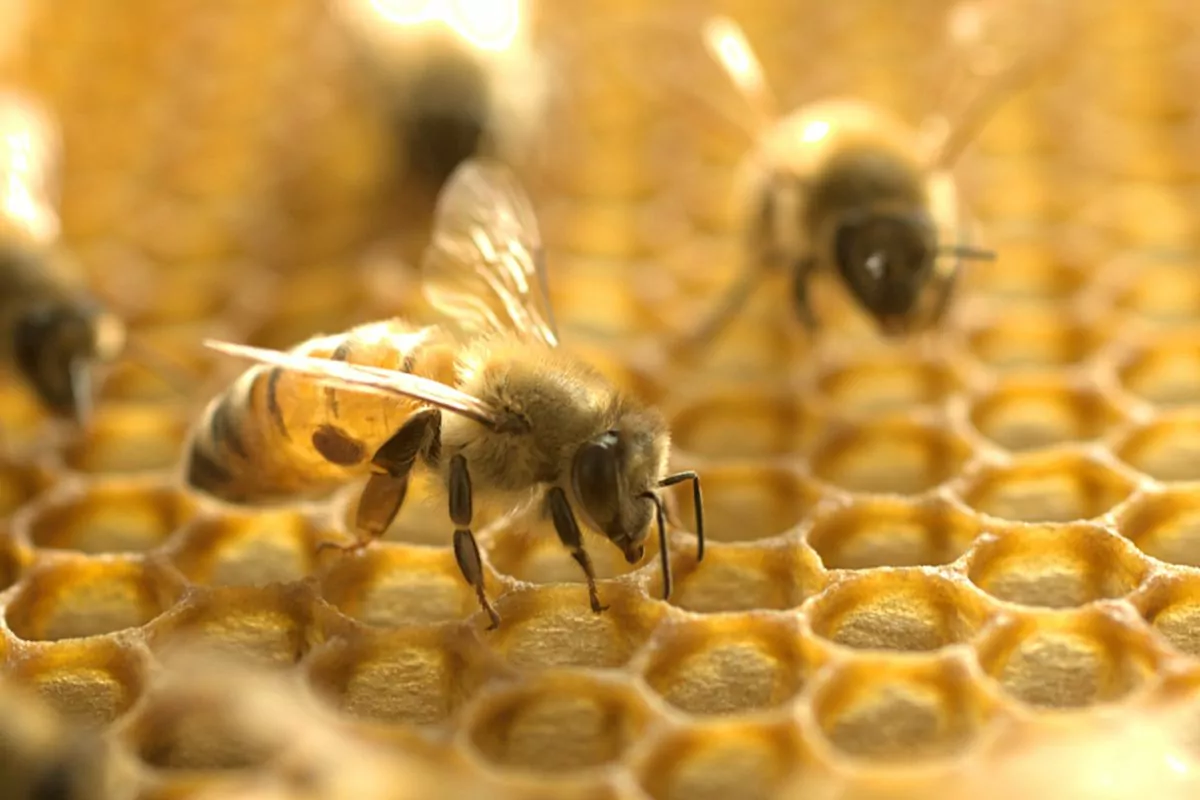
As many of you reading this article will already know, there are quite a few different species of bees out there, and each of them have their own unique distinctive appearance and characteristics. This may therefore prompt the question, do all bee species make honey, or just a few?
Well, the answer varies from species to species. For example, the main type of bee that produces honey in the manner we’ve discussed in this article is the honey bee. They go through the whole process of collecting nectar and pollen religiously throughout the perennial months, in order to stock up for the winter.
Bumble bees however, don’t stock up on honey for the winter months, but they do in fact, produce honey. If any of you are wondering why they only store their honey for a very short period of time, it’s all to do with their life cycle.
Bumble bees have a much shorter lifespan than honey bees, and as a result, they don’t need to store honey for the winter months. In fact, the only bee that will survive the winter in terms of bumble bees, is the Queen bee. There is one other type of bee that produces honey, and this is called the stingless bees.
Just like the bumble bee, however, the stringless bee doesn’t produce large quantities of honey to survive throughout the winter months, but instead, just produces smaller amounts for sustenance. Wasps can also feed on nectar, in case any of you were curious.
Unlike the bee species that we’ve discussed above, however, they aren’t actually able to transform this into honey. They do however, thrive on the nectar in order to survive. Adult wasps will feed on nectar exclusively, whereas young wasps will feed on prey that their parents kill and feed them with.
Do The Queen Bees Eat The Honey?
Another frequently asked question that we have surrounding the production of honey, is whether or not the Queen bee herself actually eats the honey. It is true that each and every one of the worker bees in the colony will feed on the honey that they’ve produced, and the Queen bee is the only one who does not ingest this substance.
The Queen bee actually feeds on something entirely different, and this substance has been called ‘royal jelly’, this is a kind of natural secretion which is produced by bees. It is used within the secretion and larvae of honey bees, and has been constructed from special cells.
It is rich in carbohydrates and amino acids, and is considered to be an incredibly nutritious substance. It has been tested in various scientific laboratories over time, and has been discovered to present numerous different health benefits.
Some researchers say that it’s so nutritious, that it can actually prevent neurodegenerative disorders, as well as preventing the growth of tumors in the body.
What Is The Role Of The Queen Bee In The Hive?
Some of you reading this article may be wondering what the role of the queen bee is in the hive. Why does she receive such special treatment from the other workers, even thriving on a different substance than the rest of the colony.
Well, first and foremost, she is the only female in the hive, and the rest of the worker bees are actually mostly her children. She is the one who is responsible for reproducing, and laying more eggs for future bees who will act as workers.
It’s fairly easy to spot the Queen bee in the hive, as she will be much larger than the other workers, in fact, she’s almost twice the size of the rest of the colony. The Queen bee is the only one who has developed ovaries, which allows her to make more bees in future.
This is her primary purpose within the hive, as well as developing a special chemical that emits throughout the area, and helps to regulate unity within the bee colony. The Queen bee typically lives for quite a long time, and can survive up to two winters if the conditions are okay.
Beekeepers will typically replace the Queen bee after this sum of time has passed, as the reproduction capabilities of the old Queen begin to dwindle.
This can be a bit of a tricky operation, and involves removing the old Queen bee from the hive, then leaving it empty for a few days in order to get rid of any residual pheromones that might be in the hive. After this, a new Queen bee is introduced to the colony, and it normally takes them a few days in order to accept a new leader.
What Happens If A Hive Doesn’t Have A Queen?
Now that we’ve discussed the role of the Queen bee within the hive, some of you might be wondering what happens if the hive loses a Queen, never to be replaced. Are they able to carry on as they normally would, producing honey from nectar and working as an efficient team?
Unfortunately, a Queenless hive usually results in disaster. First and foremost, there is nobody to lay new eggs and reproduce new worker bees, (see also: How Do Bees Reproduce?)because the Queen is the only one with ovaries fertile enough to lay eggs. Therefore, one of the telltale signs that a hive has lost their Queen is that the population is dying out.
The older worker bees will die out, and there will be no new bees to replace them. Another thing that happens in a Queenless hive is an abundance of honey. The bees will continually be producing honey stores, but there will be very few workers there to consume it.
Finally, a Queenless hive also tends to be far more irate, and if you go near them, they will typically make a high pitched noise. Essentially, without a Queen, the rest of the hive will surely perish, as there will be nobody else to produce more eggs, ensuring the survival of further generations of bees.
Some Interesting Facts About Honey Bees
Now that we’ve taken a closer look at the honey bee population, and discussed their honey production in depth, we can move on to discuss some interesting facts about honey bees to finish off our article. Keep reading below to learn more.
- Only Female Honey bees have the capacity to sting. So, if you’ve ever been stung by a honey bee before, you can guarantee that the culprit was female. The males themselves don’t actually have stingers. Queen bee’s can also sting, but they typically always stay incredibly close to their hive, and don’t tend to venture out very far.
- When it comes to laying eggs, the Queen bee is actually able to lay up to 3000 eggs per day, which is a colossal amount.
- Honey bees need a lot of energy in order to thrive and survive, this is proven by the fact that they can flap their wings up to 200 times per second.
- Each honey bee will make approximately one twelfth of a teaspoon of honey in their lifetime. This doesn’t sound like much, but considering that there are thousands upon thousands in the colony, this means that they actually gather a heck of a lot.
- Honey bees actually have small tongues which they use to taste their food.
Final Thoughts
To sum up, the reason why honey bees make honey is to stock up on food during the winter months. Because they’re incredibly sensitive to cold temperatures, and there are few flowers to pollinate during winter, they need to make sure that they have plenty of honey in order to survive.
- Will Robber Bees Kill the Queen? & How to Prevent This? - April 30, 2024
- Does Bleach Kill Bees? - April 23, 2024
- How Do I Get Rid of Ants Without Harming Bees? - April 16, 2024

